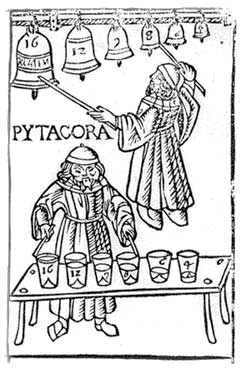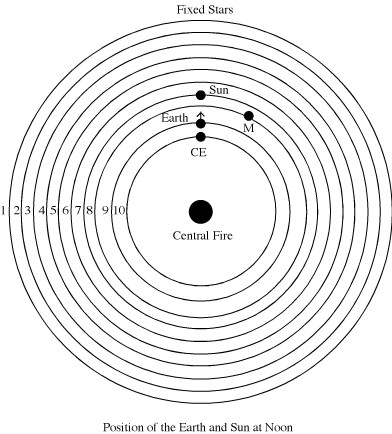Philolaus of Croton

Philolaus (c. 475 BC) systematized the number theory of Pythagoras. He stressed the importance of numerical groupings and the divine properties of number. He conceived number ‘one’ or the Monad as ‘the first principle of all things’. The Monad is the unified principle in the center of the sphere identified with the central fire: the hearth. It is noteworthy that Philolaus’ theory of the central fire is of great significance since it removes for the first time the earth form the center of the universe.

Fragments
Fr. 1: Nature (physis) in the world-order (cosmos) was fitted together out of things which are unlimited and out of things which are limiting, both the world-order as a whole and everything in it.
Fr. 4: And indeed all things that are known have number. For it is not possible that anything whatsoever be understood or known without this.
Fr. 5: Number, indeed, has two proper kinds, odd and even, and a third from both mixed together, the even-odd. Of each of these two kinds there are many forms, of which each thing itself gives signs.
Fr. 6: …since these beginnings [i.e. limiters and unlimiteds] pre-existed and were neither alike nor even related, it would not have been possible for them to be ordered, if a harmony had not come upon them… Like things and related things did not in addition require any harmony, but things that are unlike and not even related … it is necessary that such things be bonded together by a harmony, if they are going to be held in an order.
Fr. 7: The first thing fitted together, the one in the center of the sphere, is called the hearth.
Fr. 13: The head [is the seat] of intellect, the heart of life (psyche) and sensation, the navel of rooting and first growth, the genitals of the sowing of seed and generation. The brain [contains] the origin of man, the heart the origin of animals, the navel the origin of plants, the genitals the origin of all (living things). For all things both flourish and grow from seed.
Fr. 14: the ancient theologians and seers also give witness that on account of certain penalties the soul is yoked to the body and is buried in it as in a tomb.
Fr. 15: … all things are encompassed by god as if in a prison …
Translated by C. Huffman
Copyright 1997-2006
Giannis Stamatellos
E-mail: gstamap@yahoo.com